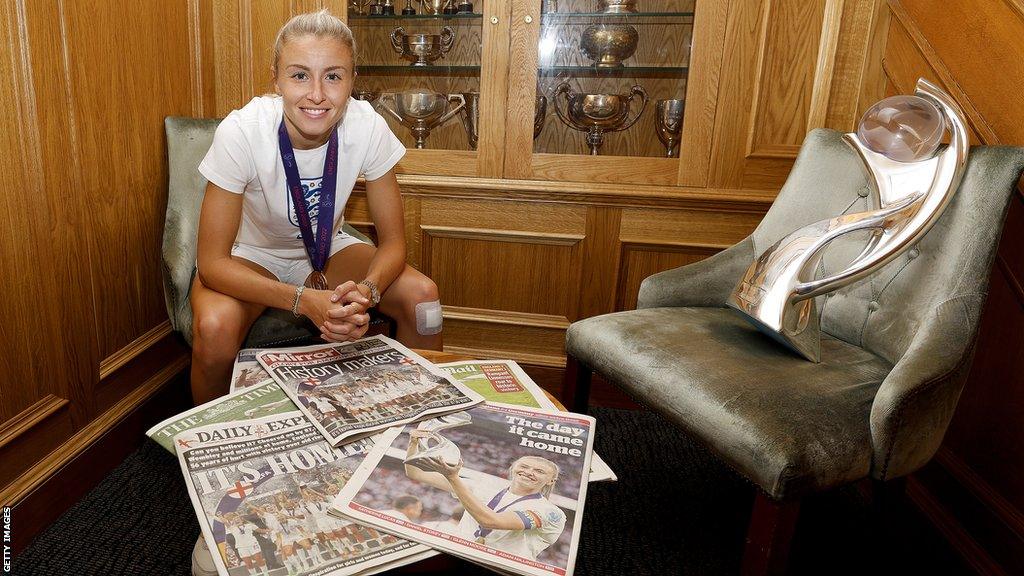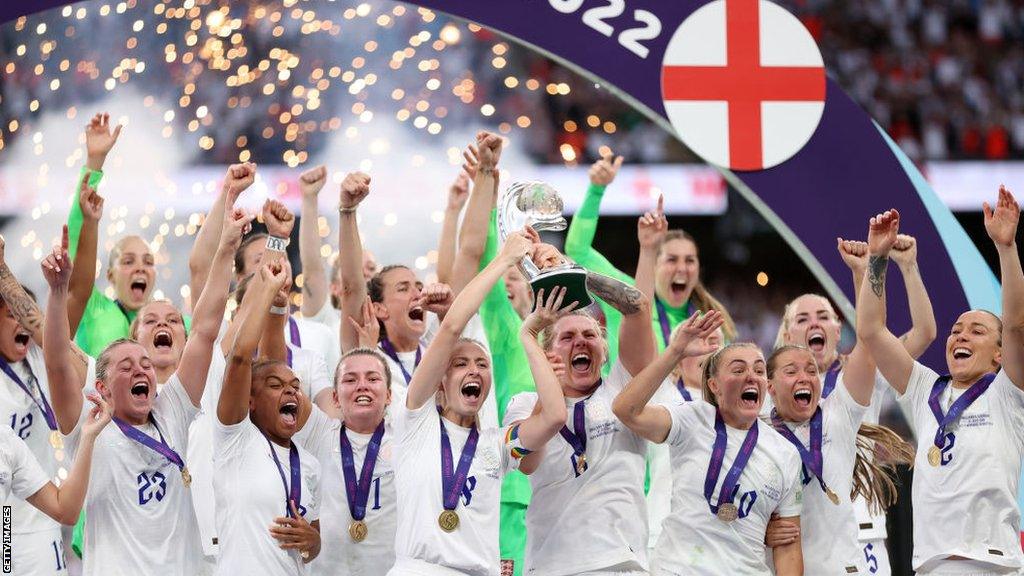Leah Williamson: England captain says 'male allies' can help but women's game not a 'stepping stone'
- Published

Leah Williamson is approaching a year as England captain, having been given the armband by head coach Sarina Wiegman in April 2022
England captain Leah Williamson says "male allies" can help grow the women's game - but she does not want to see it used as a "stepping stone".
Since Williamson skippered England to Euro 2022 glory last summer, Women's Super League crowds have risen by 200%.
But the women's game still trails the men's in areas like profile and pay.
"If people are going to get involved, they need to be invested and have our best interests at heart," Williamson told BBC Radio 4's Woman's Hour.
The Arsenal midfielder was speaking after being ranked first in the Woman's Hour Power List of the top 30 outstanding women in UK sport.Williamson said she welcomed male involvement - men work as coaches, pundits and in other roles within the women's game - but does not want work within women's football to be viewed as a route into the men's game.
"The only thing I'm concerned of is that, as a growing sport, we are used as a stepping stone into men's [football]," the 25-year-old added.
"But I do think that we do have good men allies - Ian Wright is obviously a major one for us and when he speaks, he speaks from the heart."
Leah Williamson on being a leader & growing the women's game
Williamson also mentioned the unity between men's and women's national team coaches Gareth Southgate and Sarina Wiegman, praising "the respect between them - I think that's what we are asking for, a level of respect".
But with BBC research suggesting that, on average, men's Premier League players earn 100 times the salary of those in the Women's Super League, Williamson believes pay equality is a long way off.
"I'm not sure I'll see that gap close in my playing time - we need to keep growing our fanbase, we need people to turn up consistently, week in, week out for these games," she said.
"These numbers are getting bigger but they need to be consistent and I think that's the quickest way to close the gap."
Schools change important but benefits 'five to 15 years away'
Following England's Euro 2022 triumph, Williamson, along with club and international team-mate Lotte Wubben-Moy, petitioned the government to create equal access to sports in schools for girls.
That appeal was a success with more than £600m of funding committed to the project, which includes extra-curricular sporting activities as well as physical education lessons during school time.
It is a change that Williamson believes might not have happened without the profile England's historic European Championship victory - the Lionesses' first ever major trophy - provided.

The 87,192 that witnessed England's Euro 2022 final win was a record attendance for a women's international fixture in Europe
"I think we maybe needed that little bit of, not proof, but 90,000 people turning up to Wembley and the success of the summer [helped]," Williamson added.
"We thought, how can we make this the new norm? I think the equal access is really important - now we have a responsibility to then push those girls to try new things.
"Hopefully we will reach out to the schools and really explain the benefits to them as well for anybody that's maybe not as much a believer as we are.
"I don't think it will be the hardest thing in the world to implement hopefully but we won't see the real change for five, 10, 15 years maybe.
"We've lived in the shadows for a long time as female footballers. I've watched people before me [in women's football] have a lot more knowledge and a lot more experience.
"I think as a team we owe it to those women to now use a platform, people are listening to us. I just don't want to waste the opportunity that we have now."
Leah Williamson was speaking to BBC Radio 4's Woman's Hour presenter Nuala McGovern.

What's in store for Manchester United? A brand-new podcast follows the sale of one of the biggest clubs in the world
The Sugababes' magical live performance: Get lost in old favourites and enjoy an unexpected cover
